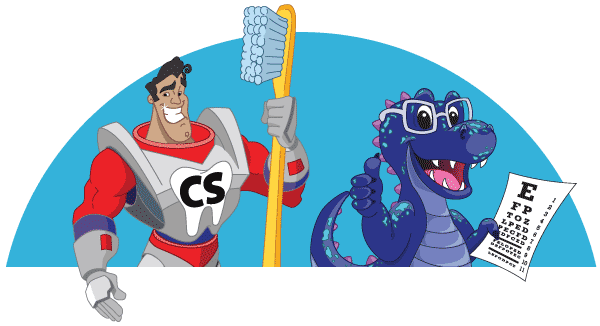Medicaid Dental Care for Kids
Milestones and Healthy Habits – 3 to 6 Years Old

It’s amazing to see how much your preschooler has learned to do in just a few short years. The early childhood years are a time when kids become more independent and are more curious about the world around them. While preschool kids may declare, “I can do it,” when it comes to brushing and flossing, an adult still needs to be involved in a child’s daily dental hygiene at this age to ensure teeth and gums are getting the care they need to stay healthy. Here are some milestones and healthy dental habits for kids ages 3 to 6 years old.
Milestones
At this stage, all baby teeth have erupted from the gums. Many kids stop thumb sucking or using a pacifier between the ages of 2 and 4. Most children this age love to learn new songs and read books. Singing and reading books about brushing teeth or going to the dentist can help preschoolers learn and get excited about good daily habits.
Healthy Habits
First, children this age should brush at least twice a day and floss between their teeth since they now have teeth right next to each other. It’s important that they begin to learn how to brush and floss but can’t do it effectively without the help of an adult.
There are lots of fun tooth brushing songs you can sing and books about visiting the dentist that can help your child establish good tooth brushing habits and know what to expect at the dentist.
Now is the time to start using fluoride toothpaste. Only use about a pea-size amount and be sure to remind your child to spit out the extra toothpaste—they shouldn’t swallow it. If you have any questions, your child’s dentist can show you the right amount and how to properly brush in a circular motion.
If your child still sucks their thumb or a pacifier, now is the time to help them lose this habit. They shouldn’t suck their thumb or use a pacifier once they start to get their permanent teeth in. If they continue sucking their thumb or a pacifier when they are getting permanent teeth in it can eventually cause trouble with their teeth lining up or affect the roof of their mouth.
Your preschooler should visit the dentist at least twice a year for a dental exam by their Medicaid dentist.
What You Need to Know
It is very important to take care of your child’s “baby” teeth. These teeth, also called primary teeth, are important to help children chew naturally and speak clearly. They are placeholders for the permanent teeth and form a path for the permanent teeth to follow when it’s time for them to break through the gums.
Even though your child will eventually lose these first teeth, preventing tooth decay in them is very important. Tooth decay in “baby” teeth can damage adult teeth as well even before they come in and that might cause problems later.
Now that your baby has turned into a preschooler, helping them eat a balanced diet is important. This helps them not only have healthy teeth and gums but will help them be healthier all around. Try to limit sugary drinks and food such as cake, cookies and candies, because they lead to tooth decay. A tooth-healthy diet includes fruits, vegetables and cheese. Sugary treats should be eaten with meals instead of as a snack. Usually, there is more saliva in the mouth during mealtimes so it’s easier for food to be washed away from teeth. Also, be sure your child isn’t constantly eating snacks throughout the day. Time between meals helps saliva wash away bacteria that can cause decay.

